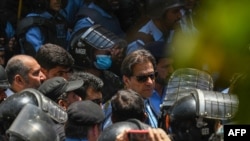A special federal court in Pakistan sentenced former Prime Minister Imran Khan and his wife to 14 years in prison on corruption charges Wednesday.
Khan, 71, and former first lady Bushra Bibi were accused of illegally retaining and selling state gifts, including jewelry and watches from Saudi Arabia’s government, when he was in office from 2018 to 2022.
The court ruling also barred them from holding public office for ten years and fined more than $2.8 million each.
The hearing was held in a prison center near Islamabad, where Khan is already serving a three-year jail sentence for a separate corruption conviction that also disqualified him from contesting an election for five years.
Khan’s opposition Pakistan Tehreek-e-Insaf, or PTI, party and its legal team confirmed Wednesday’s conviction, the second in two days for the incarcerated cricket hero-turned-politician ahead of the February 8 parliamentary elections in Pakistan.
“The former lady was not in the court when the decision was announced, but now she has surrendered,” said a PTI statement Wednesday. It decried the unilateral verdict as “another sad day in our judicial system history, which is being dismantled.” The party said it would challenge the conviction in a higher court.
“Why are you in a hurry? Even yesterday, the conviction was announced in haste,” local media quoted Khan as asking the judge Wednesday and urging him to wait for his lawyers to arrive. Khan left the courtroom reportedly before the court announced the verdict.
On Tuesday, a special court jailed Khan and his former foreign minister, Shah Mahmood Qureshi, for ten years each on charges they revealed state secrets involving the United States while in office.
Khan’s lawyer, Salman Safdar, described the cipher verdict as unconstitutional, telling reporters it would not withstand the scrutiny of a higher court.
“The cross-examination on as many as 18 witnesses was carried out in the late hours and earlier this morning,” Safdar said. “The legal team was kept out; they were not given permission to enter the jail.”
In its editorial Wednesday, the prestigious English-language DAWN newspaper denounced Khan's conviction in the cipher trial. "Given how hastily the special court, appointed under the Official Secrets Act, had been proceeding in the cipher case trial, seemingly without regard for due process, a rushed verdict had been expected,” the editorial read.
It noted that “the case was wrapped up at breakneck speed in a marathon session that ran till well into the night. Everything made it seem as if some kind of [a] deadline had been set for the trial to be concluded and a verdict issued.”
Khan is accused of publicly discussing the contents of a confidential diplomatic cable, internally known as a cipher, between Washington and Islamabad that he said proved his ouster from office through a no-confidence vote in April 2022 was orchestrated by the Pakistani military at the behest of the United States.
Officials in both countries have denied the accusations.
“It is a legal matter ultimately for Pakistan’s courts,” State Department spokesperson Mathew Miller told reporters Tuesday when asked for comments on Khan’s sentencing in the cipher case.
“We have been following the cases brought against the former prime minister but don’t have any comment on the sentencing…We continue to call for the respect of democratic principles, human rights, and the rule of law in Pakistan, as we do around the world,” Miller said.
Pakistan’s ambassador to Washington sent the cipher to Islamabad in March 2022 after a meeting with U.S. State Department officials.
The classified document reportedly quoted a U.S. official as expressing concern about Khan’s neutral stance on the Russian invasion of Ukraine and cautioning that Islamabad might face isolation from Western allies if he continued office.
Khan’s party is contesting the upcoming elections amid a government crackdown on its supporters and candidates. The Election Commission of Pakistan also barred PTI from using its iconic cricket bat logo on ballot papers in the lead-up, a move widely criticized as pre-poll rigging to sideline the party.
Despite the crackdown, recent public opinion polls showed Khan is the most popular politician in Pakistan, and the PTI is the largest national political party.
The deposed prime minister swept into office when his PTI won the 2018 parliamentary elections, but he eventually developed differences with the military over key national security appointments and foreign policy matters that critics blame for his removal from office.
Khan denies any wrongdoing while in power and has appealed his convictions. He accuses the military of orchestrating nearly 200 frivolous charges against him, ranging from rioting and corruption to terrorism since his ouster to keep him from staging a political comeback.
The interim Pakistani government rejects allegations that any state institution is interfering in politics or attempting to impact the outcome of the elections.
However, critics and Pakistani mainstream politicians question those assertions, citing repeated military coups in the country that led to several decades of dictatorial rules since it gained independence from Britain in 1947.
Army generals have been constantly accused of helping to create or dislodge elected governments even when the military is not in power.




